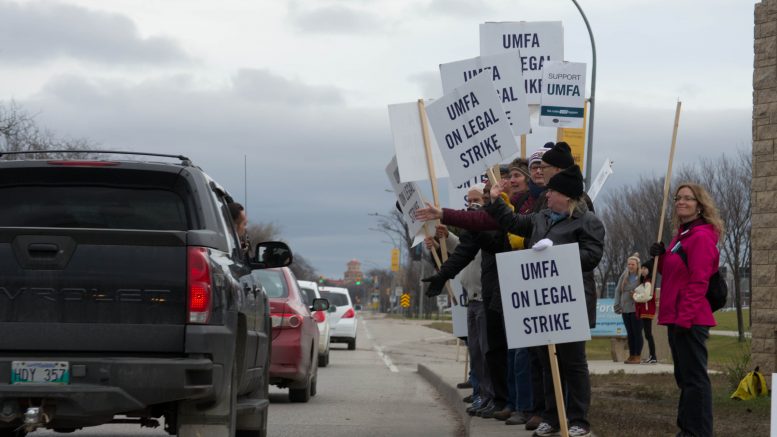The University of Manitoba Faculty Association (UMFA) ratified a one-year settlement agreement Monday evening, calling an end to a strike that stretched for three weeks.
Shortly after 10 p.m., the union – which represents 1,200 professors, researchers, and librarians – announced that a proposal including workload protections, enhancements to collegial governance, and collaborative assessment practices received overwhelming support from membership.
With the agreement in place, all classes affected by the three-week strike are scheduled to resume today.
The settlement also includes a commitment by University of Manitoba administration not to lay off any member librarians or instructors before the start of 2019.
UMFA president Mark Hudson said the wins secured by the union will positively impact both students and faculty alike and could not have been achieved without the labour action.
“There are some very significant gains in there, I think – gains that we never would have gotten without the strike and without the strike vote,” he said.
“Those really do go to the heart of the actual student experience,” he said, “and give us, as faculty members, a little bit more control over how it is that we will do our work and therefore how it is that we will be able to interact with students.”
The contract does not include a salary increase – a consequence of the provincial government directing the university in October to extend the existing agreement an additional year without a raise.
UMFA filed a complaint with the Manitoba Labour Board in relation, claiming the university was not bargaining in good faith after it withdrew a previously forwarded four-year, seven per cent offer.
Workload protections in the agreement include a governance model – similar to one used at the University of Saskatchewan – that gives faculty more of a say in developing their schedule. The promotion and tenure framework within the agreement also substitutes the complete authority of deans for a more collaborative process.
The agreement calls for a six-member committee made up of faculty – three appointed by UMFA, three by the administration – to study the risks and benefits of performance metrics. If the committee recommends their use, “very powerful limitations” are inserted into the collective agreement, said Hudson.
A joint committee will also be struck to examine gender-based salary differentials, whether a gap exists, and how it can be addressed.
UMFA began picketing Nov. 1, affecting hundreds of classes, after more than six months of negotiations failed to reach a resolution. Members have been without a contract since the last agreement expired March 31.
While a revised academic schedule approved by the U of M senate called for the cancellation of the winter reading break if the strike continued into this week, the university issued a release Monday committing to maintain the February break as regularly scheduled.
In a release published after the agreement was ratified, U of M president David Barnard said the administration is committed to ensuring a quick transition back to class.
“The last few weeks have been challenging, and at times divisive, but it is my hope that our community will reunite in support of our commitment to our shared mission of teaching, discovery and engagement,” he said in the release.
Student support “critical”
On Friday, roughly 200 students joined UMFA on the picket line before marching into the administrative building as a show of support to faculty.
The rally was organized by members of the University of Manitoba Student Action Network and the University of Manitoba Students’ Union, which adopted a position supporting faculty’s educational and childcare demands at its last regular meeting on Nov. 10.
Hudson said student support for faculty not only buoyed the spirits on the picket lines but played a critical role in pressuring the university toward an agreement.
“Far from being held hostage, as the administration wanted to portray students, students were taking an active role in it,” he said.
“Students were actually engaging with the issues. They were looking for themselves to see what the issues were […] and then becoming real actors in the strike. Not bystanders. Not hostages. But actually taking matters into their own hands, making their voices heard.
“That had an incredible, critical impact on the strike and our ability to get a good agreement.”


